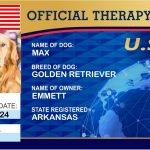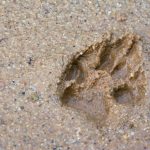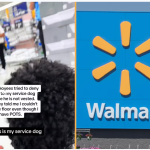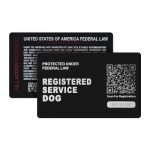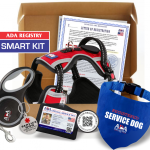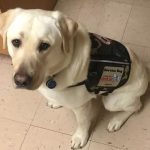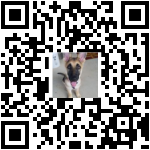Four-Legged Heroes
August 31, 2020
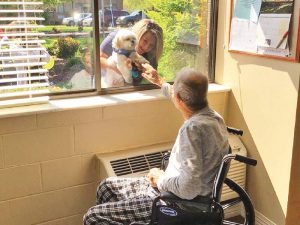
What front-line heroes have four legs and a tail? Gracie the Goat, Porky the Pig and Dopey the Cat are a few. From farm animals to family pets, local organizations like Hospice of Chattanooga, Alleo Health System, McKamey Animal Center and Erlanger Health System work with volunteers to provide pet therapy in our community.
These stories are a tribute to the furry front-line heroes dutifully serving vulnerable populations during a time when a little unconditional love goes a long way.
Lining the sidewalk of NHC HealthCare, a parade of animals prances around the building smiling brightly at the residents inside. Don’t worry, they aren’t lost; they are front-line heroes.
One of these workers is Maggie, a middle-aged border collie who loves people and playing fetch. She starts her afternoon shift at NHC HealthCare among other four-legged friends.
Instead of pausing its Caring Paws Program, Hospice of Chattanooga took a different route, launching pet parades for the population most vulnerable to COVID-19.
The parades attract pet-lovers and volunteers from across the Chattanooga area, including Kathy Mindel, Maggie’s owner and local chapter leader for Love on a Leash, a national nonprofit that partners with communities to provide volunteers and implement animal therapy services in nursing homes, hospitals, schools and other places.
“The residents are not able to see many people right now, so you can imagine how overjoyed they are. It’s incredibly heartwarming to watch them engage with the animals through the windows,” Mindel says. “Often, we are with people as they undergo scary experiences like making a life transition, waiting on a lab report or spending last moments with a loved one. During these times, animals settle them in a unique way with their touch and gentleness.”
Under Alleo Health, Hospice’s Caring Paws is the only certified volunteer hospice pet program in the area. During regular operations prior to COVID-19, the program welcomes many visitors from Love on a Leash, including a retired veteran and his furry companion.
“When veterans are about to pass away, he actually does pinning services to thank them for their service. The ceremony gives these patients a sense of purpose and closure that they otherwise may not have had toward the end of their life,” says Lily Quinn, Alleo Health’s Strategic Communications Coordinator.
Even amid a pandemic, Hospice of Chattanooga operates with the belief that no one should die alone.
“We just want them to know, ‘Hey, we’re still thinking of you. We still love you. And we’re still here for you. It just looks different right now,'” Quinn says.
Every year, McKamey Animal Center (MAC) serves as a refuge to an average of 7,000 abandoned animals from the Chattanooga, Lakesite and Red Bank areas. During the pandemic, they saw a surge in adoptions.
Some adopters thought quarantine was the ideal time to commit to potty training. Others were looking for a companion who would ease their anxiety and console them during an uncertain time.
“As a social person, I thought to myself, it would be challenging to quarantine alone. Even if you’re not formally adopting an emotional support animal, there’s definitely something to be said about how animals help your emotional state, whether you realize it or not,” says Crystal Evans, MAC’s Executive Assistant and Program Coordinator.
No two work days are the same for Evans. She recently reflected on why she loves her job while driving home from a local nonprofit one Friday afternoon. The day before Evans received a call from Partnership for Families, Children and Adults (Partnership FCA), a local organization specializing in counseling, crisis intervention and prevention services.
Alongside animal adoption, domestic violence reports have spiked during the COVID-19 pandemic. In April, the National Domestic Violence Hotline reported a 15% increase in its contact volume, and 10% of those contacts cited COVID-19 repercussions as a reason for abuse.
One of Partnership FCA’s residents needed MAC resources to vaccinate her beloved cat, so it could live with her in a shelter while she recovered from an abusive situation. Without vaccination, she would have to say goodbye to the 12-year-old best friend who accompanied her down a long, hard road.
“The cat is the one constant thing in her life. More than likely, the abuse was ongoing, not an isolated incident, so I’m sure it brought her countless hours of comfort in a challenging season,” Evans says.
Coming to the rescue, MAC completed the vaccination free of charge through funds it receives from the Angel Fund, which runs strictly on individual grants and donations.
“We don’t just save animals. We help people too. That’s what drives me to go to work every day,” Evans says.
MAC believes that no one should have to surrender a pet because they can’t afford to fit kibble in their budget. To help, it offers a PET Food Bank for people hit hardest by economic challenges.
As coronavirus continues to impact lives, MAC hopes to match more animals with people in need. If you ask them why you should adopt, they present a convincing case.
“Millions of animals are surrendered to shelters and rescues every year, including purebred animals. So, if you are interested in a certain breed, there are numerous breed-specific rescues you can adopt instead of purchase. We here at MAC receive many purebred animals yearly,” Evans says.
Erlanger’s Pet Therapy Program also provides an outlet for dog owners looking to volunteer their pets and time. Many of these volunteers are coordinated through Love on a Leash. Though Erlanger’s program is suspended due to COVID-19, Erlanger continues to raise awareness about its services and prepare volunteers for reopening.
“In the past, we’ve used therapy dogs in various settings, including in our occupational therapy department where they support patients working to recover their balance,” says Samantha Printup, Erlanger’s Ambassador and Pet Therapy Coordinator.
In addition to Love on a Leash, Erlanger partners with Human Animal Bond in Tennessee (HABIT), a program of The University of Tennessee College of Veterinary Medicine, which sponsors animal-
assisted therapy programs. To apply for Erlanger’s program, you must attend a HABIT Information Meeting and give your dog a behavior evaluation. After passing, your dog will become an official Erlanger K-9 Ambassador.
“I’ve been in rooms where we have spent a significant amount of time watching people’s heart rates and blood pressures go down on the monitor,” Printup says. “And that’s just one of many examples, showing how animal therapy positively impacts everyone involved at Erlanger.”
Check Out Our Store


